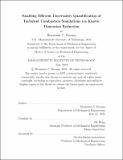Enabling Efficient Uncertainty Quantification of Turbulent Combustion Simulations via Kinetic Dimension Reduction
Author(s)
Koenig, Benjamin C.
DownloadThesis PDF (7.816Mb)
Advisor
Deng, Sili
Terms of use
Metadata
Show full item recordAbstract
Propagating uncertainties in kinetic models through combustion simulations can provide important metrics on the reliability and accuracy of a model, but remains a challenging and numerically expensive problem especially for large kinetic mechanisms and expensive turbulent combustion simulations. Various surrogate model and dimension reduction techniques have previously been applied in order to reduce the cost of forward uncertainty propagation in combustion simulations, but these are often limited to low-dimensional, simple combustion cases with scalar solution targets. In the current work, a neural network-accelerated framework for identifying a low-dimensional active kinetic subspace was developed that applies to the entire temperature solution space of a flamelet table and can capture the mixture fraction and strain rate dependent effects of the kinetic uncertainty. The computational savings enabled by this novel framework were demonstrated through a proof-of-concept, flamelet-based application in a Reynolds-averaged Sandia Flame D simulation using a chemical mechanism for methane combustion with 217 reactions. By leveraging the large dimensional compression and low-cost scaling of the active subspace method, offloading the initial dimension reduction gradient sampling onto the laminar flamelet simulations, and accelerating the gradient sampling process with a specifically designed neural network, it was possible to estimate the temperature uncertainty profiles across the solution space of the turbulent flame with strong accuracy of 70-85% using just seven perturbed solutions. Additionally, as it occurs entirely within the flamelet table, the cost of identifying the reduced subspace does not scale with the cost of the turbulent combustion model, which is a promising feature of this framework for future application to larger-scale and more complex turbulent combustion applications.
Date issued
2023-06Department
Massachusetts Institute of Technology. Department of Mechanical EngineeringPublisher
Massachusetts Institute of Technology